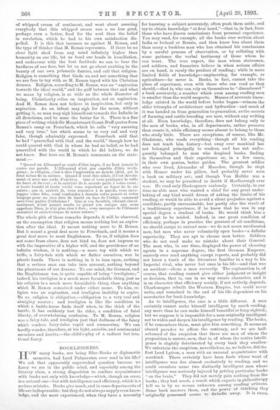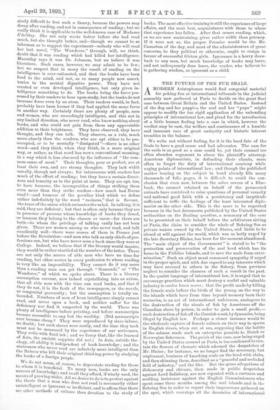BOOKLESSNESS.
HOW many books, not being Blue-Books or diplomatic memoirs, had Lord Palmerston ever read in his life? We ask that apparently unprovoked question because we fancy we see in the public mind, and especially among the literary class, a strong disposition to confuse acquaintance with books not only with knowledge—which, though an error, is a natural one—but with intelligence and efficiency, which is a serious mistake. Books give much, and in some departments of life are indispensable; but they do not always supply even know- ledge, and the most experienced, when they have a necessity for knowing a subject accurately, often push them aside, and try to obtain knowledge "at first hand,"—that is, in fact, from those who have drawn conclusions from personal experience. You may read, for example, all the books ever written about India or Ireland or Russia, and then know less about them than many a bookless man who has obtained his conclusions by a careful process of observation, or by collating with some patience the verbal testimony of those whom he can trust. The true expert, the man whom statesmen, and soldiers, and financiers believe in when serious affairs are on hand, is rarely the product of reading; while in more limited fields of knowledge—engineering, for example, or agriculture—he never is. Books, in fact, cannot take the place of experience, even with those who can read as they should,—that is, who can rely on themselves to " disembowel " a book accurately, a number which even among reading men is smaller than the world suspects. Masses of accurate know- ledge existed in the world before books began—witness the older triumphs of architecture and hydraulics—and much of it was banded on from generation to generation, as the secrets of farming and cattle-breeding are now, without any writing at all. Even knowledge, therefore, does not belong only to the men of books, who, in all departments, rather preserve than create it, while efficiency seems almost to belong to those who study little. There are exceptions, of course, like Mr. Gladstone, who reads everything—though all his reading does not teach him history—but sway over mankind has not belonged principally to readers, and has not unfre- quently belonged to men who despised books, finding in themselves and their experience or, in a few cases, in their own genius, better guides. The greatest soldier who ever lived, Alexander of Macedon, though he slept with Homer under his pillow, had probably never seen a book on military art; and though Von Moltke was a student, we may be permitted to doubt if Marlborough over was. He read only Shakespeare zealously. Certainly, in our time no able man who wanted a chief for any great under- taking of any kind would dream of asking the limits of his reading, or would be able to avoid a silent prejudice against a candidate, partly unreasonable, but partly also the result of a traditionary experience, if he knew that he was in any special degree a student of books. He would think him a man apt to be misled. Indeed, in one great condition of efficiency, perhaps in practice the greatest of all conditions, we should assign to unread men—we do not mean uneducated men, but men who never voluntarily open books—a definite superiority. They are apt to choose men better. Soldiers who do not read make no mistake about their General. The man who, in our time, displayed the power of choosing agents in a supreme degree, the first German Emperor, scarcely ever read anything except reports, and probably did not know a tenth of the literature familiar in a way to his Imperial rival, who never but once in his life—and that was an accident—chose a man correctly. The explanation is, of course, that reading cannot give either judgment or insight or decision, that is, can in no way create character, and it is on character that efficiency mainly, if not entirely, depends. Charlemagne rebuilt the Western Empire, but could never write, and remained to the end of his life dependent on his secretaries for book-knowledge.
As to intelligence, the case is a little different. A man certainly cannot make himself intelligent by much reading, any more than he can make himself beautiful or long-sighted ; but we suppose it is impossible for a man originally intelligent not to widen and deepen his intelligence by reading. The books, if he remembers them, mast give him something. It seems an absurd paradox to affirm the contrary, and we are half- ashamed of the suspicion that there are men of whom the proposition is untrue, men, that is, of whom the native intelli- gence is slightly deteriorated by every book they swallow' We entertain the suspicion, nevertheless, as, we believe, did the first Lord Lytton, a man with an unusual acquaintance with mankind. There certainly have been fools whose want of intelligence was due almost exclusively to reading, and we could ourselves name two distinctly intelligent men whose intelligence was seriously injured by getting particular books
"on the brain." They did not merely gain nothing from the books ; they lost much, a result which, experts in philanthropy
tell us is by no means unknown among reading artisans. Some book masters them, and the power of thinking they originally possessed seems to dwindle away. It is exces- eively difficult to test such a theory, because the powers may decay after reading, and not in consequence of reading ; but we really think it is applicable to the well-known case of Madame d'Arblay. She not only wrote better before she had read much, but she thought better, and—though we cannot be so inhuman as to suggest the experiment—nobody who will read her last novel, " The Wanderer," through, will, we think, doubt that it was reading which had killed her intelligence. Macaulay says it was Dr. Johnson, but we believe it was literature. Such cases, however, we may admit to be few; but we suspect that in many the result of reading on the intelligence is over-estimated, and that the books have been food to the mind, and not, as so many people now assert, tonics to the mental digestive power. They have not created or even developed intelligence, but only given in- telligence something to do. The books bring the force pos- sessed by their readers to bear upon study, but the books do not increase force even by an atom. Their readers would, in fact, probably have been keener if they had applied the same force in another way. Certainly there are plenty of people, men and women, who are exceedingly intelligent, and this not in any limited direction, who never read, who know nothing about books, and who could not gain from them any appreciable addition to their brightness. They have observed, they have thought, and they can talk. They observe, as a rule, much more closely than the readers, who are apt either to be pre- occupied, or to be mentally " dissipated "—there is no other word—and they think, when they think, in a more original way, or rather, as that word has now a conventional meaning; in a way which is less obscured by the influence of " the com- mon-sense of moat." Their thoughts, poor or perfect, are at least their own, and are strong thoughts. They lack width usually, though not always ; for intercourse with readers has much of the effect of reading; but they have a certain direct- ness and tenacity as to the point at issue. They are apt, too, to have humour, the incongruities of things striking them even more than they strike readers—how much bad Burns
• read P—and humour of the peculiar kind which we define rather indefinitely by the word " raciness," that is flavour, the trace of the onion which animates the salad. In talking, it is said, they are deficient ; but that is often only because they are in presence of persons whose knowledge of hooka they dread, -or because they belong to the classes or races—for there are both—to whom the privilege of talking easily has not been given. There are women among us who never read, and talk 'excellently well—there were scores of them in France just before the Revolution—and men who talk as only chiefs of pro- fessions can, but who have never seen a book since they were at 'College. Indeed, we believe that if the literary would inquire, they would be rather startled at the number of the latter. There -are not only the scores of able men who have no time for reading, but other scores in every profession to whom reading is very like an impossibility. They cannot do it any more than a reading man can get through " Sismondi," or " The Wanderer," of which we spoke above. There is a literary assumption current, now indeed crystallising into an axiom, that all able men with the time can read books, and that if 'they do not, it is the fault of the newspapers, or the novels, or congenital perversity ; but the assumption is totally un- founded. Numbers of men of keen intelligence simply cannot read, and never open a book, and neither suffer for the deficiency nor find it suspected by the world. There was plenty of intelligence before printing, and before manuscripts became accessible to any but the wealthy. (Did manuscripts 'ever become cheap ? They were reproduced by slave-labour, no doubt; but such slaves were costly, and the time they took must not be measured by the experience of our scriveners. They write with fluid ink ; and we fancy that, like the learned of Asia, the ancient copyists did not.) In Asia, outside the- ology, all ability is independent of book-knowledge ; and the statesmen who never read are infinitely more intelligent than the Baboos who kill their original thinking-power by studying the books of a foreign people.
We do not mean, of course, to depreciate reading for those to whom it is beneficial. To many men, books are the only sources of knowledge; and to all they afford, if wisely used, the means of growing wider. All we desire to do is to protest against the thesis that a man who does not read is necessarily either unintelligent or ignorant or inefficient, and to affirm that there are other methods of culture than devotion to the study of books. The most effective training is still the experience of large affairs, and the next best, acquaintance with those to whom that experience has fallen. After that comes reading, which, as we are now maintaining, gives rather, width than potency. If it were not so, the proper Premier would be the Mr. Casaubon of the day, and most of the administrators of great concerns, be they political or otherwise, ought to resign in favour of successful Girton girls. Ignorance is a heavy draw- back to any man, but much knowledge of books may leave, and not unfrequently does leave, the reader, who believes he is gathering wisdom, as ignorant as a child.



















































 Previous page
Previous page